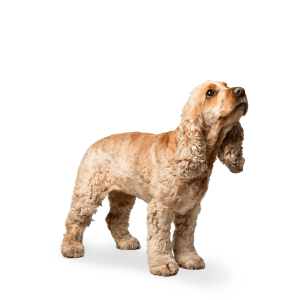

The importance of a healthy microbiome for dogs
You may have heard the term ‘microbiome’ getting thrown around a lot recently – on TV, in award-winning books, and even just in everyday conversation – and there’s good reason for that.
The term ‘microbiome’ refers to the community of bacteria that live inside us (and other living organisms), in the gut, but also in the mouth and other areas of the body. Recent research from leading scientists, including Tim Spector, has suggested that a healthy microbiome plays an immense role in promoting overall health, longevity and wellbeing.
Of course, our pets have microbiomes too…
What is your pet’s microbiome?
The right way to think of a microbiome (both yours and your pet’s) is as a living ecosystem that exists inside the body. But instead of lush vegetation, voles, badgers, and maybe the occasional wildebeest, this entire ecosystem is made up of a careful balance of microorganisms, including fungi, bacteria and viruses.
The more we learn about the microbiome, the more incredible we find out it is. Increasingly, the microbiome is even being seen as a functioning organ in its own right.
The gut microbiome is perhaps the one that gets the most attention. It’s made up of all the microorganisms living along the gastrointestinal tract, from the mouth to the tail. In dogs, around 98% of the gut microbiome is made up of bacteria.

These good microorganisms live in harmony with your dog’s body, with dog and microbiome supporting each other in various ways.
Here’s just one example: bacteria in the intestine ferment some types of food, producing important nutrients and ‘postbiotics’ for your dog to use. For example, they break down certain types of fibre into short-chain-fatty-acids (SCFAs). These SCFAs are then absorbed by your dog’s colon and used for energy. In this way, the bacteria help your dog by releasing an energy source from fibre, which your dog otherwise wouldn’t have been able to digest and use. Read our guide to the benefits of fibre in dogs.
A healthy microbiome may also be one of the keys to a healthy mind, as it’s now known that a large portion of the body’s serotonin is actually made in the intestine. Serotonin is a very important neurotransmitter, meaning it plays a vital role in the nervous system. It’s also known as a ‘happy hormone’ that influences mood.
All in all, there’s good reason to think that a healthy gut microbiome could also be important for controlling anxiety.
So, what’s your dog doing to contribute to this great two-way relationship? Well, other than providing shelter for those friendly microbes, the cells lining your dog’s intestine also feed the bacteria by producing a mucous that they consume. Everybody wins!

Why is a healthy microbiome important?
The microbiome is important because it’s involved in several bodily functions, including:
- Teaching the immune system the difference between ‘normal’ or ‘good’ microorganisms and infectious agents (such as harmful bacteria and viruses)
- Protecting against infectious agents
- Metabolism, or converting food into energy
In a healthy microbiome, the vast majority of bacteria are beneficial, with only a very small number being harmful.
As long as the immune system is also healthy, it will ‘tolerate’ these good bacteria – meaning that it won’t react to them. But if the number of harmful bacteria living in the microbiome increases, the immune system will start to attack the microbiome. Importantly, it will also start to attack the tissues that the microbes are living on.

What would this mean for your dog? Well, let’s take the mouth for example. In your dog’s mouth, an unbalanced microbiome can cause the immune system to attack various tissues, including the gums and the ligaments that hold your dog’s teeth in place.
This can lead to a wide range of negative effects.
While more research is needed into the various implications of an imbalanced microbiome, it’s clear that the microbiome is an important part of your dog’s body!
Signs of a poor microbiome in dogs
There’s no clear-cut, one-size-fits-all list of signs that indicate an imbalanced microbiome. That’s because an imbalanced microbiome is thought to have a vast range of potential knock-on effects.
In your dog’s mouth, an imbalanced microbiome may contribute to:
- Bad breath
- Red, swollen gums which may bleed easily
- Red, swollen lips, inner cheeks, tongue, or fauces (back of the mouth)
- Tooth loss
If you’re worried that your dog has any of the above, you should call your vet as soon as possible.

A chronic imbalance in the gut microbiome can mean the gut’s defence system can become impaired, and substances that normally can’t pass through the gut wall are now able to get through and enter the bloodstream. Some signs of this include:
- Diarrhoea or soft stools
- Excessive gas
- Weight loss
It can also lead to more serious complications, so you should check in with your vet as soon as possible if you suspect this.
How can I help support my dog’s microbiome?
Your dog’s microbiome will be affected by many things, such as age, genetics, and diet. Currently, there’s lots of ongoing research into how diet can alter the microbiome, and which diets are best for a healthy microbiome. The aim of a microbiome-friendly diet is to support naturally good bacteria while limiting bad bacteria, in order to restore an optimal balance.
Consider the right supplement to help support your dog’s microbiome
Taking steps to ensure your dog has a healthy microbiome is one of the best things you can do to support their health and wellbeing. While diet and lifestyle are the first – and most important – things to get right when it comes to supporting your dog’s microbiome, we’d also recommend giving them YuMOVE Digestive Care Probiotic & Fibre.
YuMOVE Probiotic & Fibre is packed with natural fibre to help support healthy anal glands and aid stool consistency, while probiotics for dogs and prebiotics help support the natural balance of the gut. Each pouch contains 12 billion CFUs of probiotic bacteria, along with prebiotics to support the natural balance of healthy bacteria in the gut.
Final thoughts
More research is needed, and plenty is already underway, into the role of the microbiome and how to use diet to change it for the better. However, enough research does already exist to show that the microbiome is important for overall health, and not just for gut health. In the mouth, an unhealthy microbiome can contribute to poor dental health. So, if your dog has red gums or unexplained smelly breath, have a chat with your vet!





